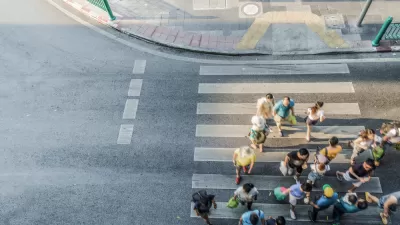The new Walkable City Rules by Jeff Speck is an excellent book that can help your city become more hospitable to humans. Urban thinker Kaid Benfield reviews.

"If the purpose of Walkable City was to tell us why we need to make more people-friendly places, Walkable City Rules is intended to tell us how. To a great extent, it succeeds in its mission."
"I absolutely love the format: The book comprises 19 sections or “parts,” each containing some three to seven “rules.” Each section (e.g., “Get the Parking Right”) is introduced briefly, and each of the rules it contains (“Eliminate On-Site Parking Requirements”) is presented in a two-page layout with a headline followed by a narrative explication, an illustration or two, and then a slightly longer and more precise restatement of the rule."
"Unlike its predecessor, Walkable City Rules is full of examples and illustrations, including 120 full-color photos and figures. The volume is excellent for browsing and should make a great reference work."
Benfield goes on with a meaty review of Speck's book, along with a strong recommendation of its worth, particularly on the subjects of attainable housing and transit. He calls it "a manifesto for reforming urban transportation policy and infrastructure and ... reducing the negative impacts of automobiles on walkability and on our cities."
FULL STORY: Jeff Speck’s Step-by-Step Guide to Making Better Urban Places

Study: Maui’s Plan to Convert Vacation Rentals to Long-Term Housing Could Cause Nearly $1 Billion Economic Loss
The plan would reduce visitor accommodation by 25,% resulting in 1,900 jobs lost.

Placekeeping: Setting a New Precedent for City Planners
How a preservation-based approach to redevelopment and urban design can prevent displacement and honor legacy communities.

Using Old Oil and Gas Wells for Green Energy Storage
Penn State researchers have found that repurposing abandoned oil and gas wells for geothermal-assisted compressed-air energy storage can boost efficiency, reduce environmental risks, and support clean energy and job transitions.

Washington State Plans Ambitious ‘Cycle Highway’ Network
The state is directing funding to close gaps in its existing bike network and make long-distance trips more accessible.

Homeowners Blame PG&E for Delays in ADU Permits
The utility says it has dramatically reduced its backlog, but applicants say they still face months-long delays for approvals for new electrical work.

Rethinking Wildfire Defense: How a Landscape Approach Can Protect Neighborhoods
Post-fire analysis of the Eaton Fire reveals that a landscape approach — including fire-resistant vegetation, home hardening, and strategic planning — can help reduce wildfire risk, challenging assumptions that trees and plants are primary fire hazards.
Urban Design for Planners 1: Software Tools
This six-course series explores essential urban design concepts using open source software and equips planners with the tools they need to participate fully in the urban design process.
Planning for Universal Design
Learn the tools for implementing Universal Design in planning regulations.
Borough of Carlisle
Caltrans
Heyer Gruel & Associates PA
Institute for Housing and Urban Development Studies (IHS)
City of Grandview
Harvard GSD Executive Education
Salt Lake City
NYU Wagner Graduate School of Public Service
City of Cambridge, Maryland


























